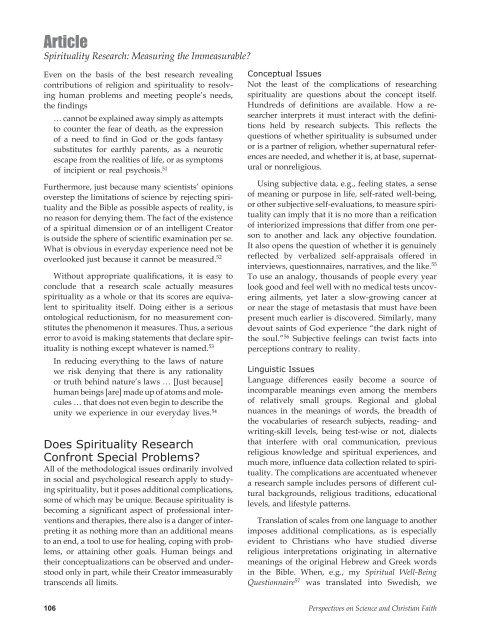ASA BLOGS - Start
ASA BLOGS - Start
ASA BLOGS - Start
You also want an ePaper? Increase the reach of your titles
YUMPU automatically turns print PDFs into web optimized ePapers that Google loves.
Article<br />
Spirituality Research: Measuring the Immeasurable?<br />
Even on the basis of the best research revealing<br />
contributions of religion and spirituality to resolving<br />
human problems and meeting people’s needs,<br />
the findings<br />
… cannot be explained away simply as attempts<br />
to counter the fear of death, as the expression<br />
of a need to find in God or the gods fantasy<br />
substitutes for earthly parents, as a neurotic<br />
escape from the realities of life, or as symptoms<br />
of incipient or real psychosis. 51<br />
Furthermore, just because many scientists’ opinions<br />
overstep the limitations of science by rejecting spirituality<br />
and the Bible as possible aspects of reality, is<br />
no reason for denying them. The fact of the existence<br />
of a spiritual dimension or of an intelligent Creator<br />
is outside the sphere of scientific examination per se.<br />
What is obvious in everyday experience need not be<br />
overlooked just because it cannot be measured. 52<br />
Without appropriate qualifications, it is easy to<br />
conclude that a research scale actually measures<br />
spirituality as a whole or that its scores are equivalent<br />
to spirituality itself. Doing either is a serious<br />
ontological reductionism, for no measurement constitutes<br />
the phenomenon it measures. Thus, a serious<br />
error to avoid is making statements that declare spirituality<br />
is nothing except whatever is named. 53<br />
In reducing everything to the laws of nature<br />
we risk denying that there is any rationality<br />
or truth behind nature’s laws … [Just because]<br />
human beings [are] made up of atoms and molecules<br />
… that does not even begin to describe the<br />
unity we experience in our everyday lives. 54<br />
Does Spirituality Research<br />
Confront Special Problems?<br />
All of the methodological issues ordinarily involved<br />
in social and psychological research apply to studying<br />
spirituality, but it poses additional complications,<br />
some of which may be unique. Because spirituality is<br />
becoming a significant aspect of professional interventions<br />
and therapies, there also is a danger of interpreting<br />
it as nothing more than an additional means<br />
to an end, a tool to use for healing, coping with problems,<br />
or attaining other goals. Human beings and<br />
their conceptualizations can be observed and understood<br />
only in part, while their Creator immeasurably<br />
transcends all limits.<br />
Conceptual Issues<br />
Not the least of the complications of researching<br />
spirituality are questions about the concept itself.<br />
Hundreds of definitions are available. How a researcher<br />
interprets it must interact with the definitions<br />
held by research subjects. This reflects the<br />
questions of whether spirituality is subsumed under<br />
or is a partner of religion, whether supernatural references<br />
are needed, and whether it is, at base, supernatural<br />
or nonreligious.<br />
Using subjective data, e.g., feeling states, a sense<br />
of meaning or purpose in life, self-rated well-being,<br />
or other subjective self-evaluations, to measure spirituality<br />
can imply that it is no more than a reification<br />
of interiorized impressions that differ from one person<br />
to another and lack any objective foundation.<br />
It also opens the question of whether it is genuinely<br />
reflected by verbalized self-appraisals offered in<br />
interviews, questionnaires, narratives, and the like. 55<br />
To use an analogy, thousands of people every year<br />
look good and feel well with no medical tests uncovering<br />
ailments, yet later a slow-growing cancer at<br />
or near the stage of metastasis that must have been<br />
present much earlier is discovered. Similarly, many<br />
devout saints of God experience “the dark night of<br />
the soul.” 56 Subjective feelings can twist facts into<br />
perceptions contrary to reality.<br />
Linguistic Issues<br />
Language differences easily become a source of<br />
incomparable meanings even among the members<br />
of relatively small groups. Regional and global<br />
nuances in the meanings of words, the breadth of<br />
the vocabularies of research subjects, reading- and<br />
writing-skill levels, being test-wise or not, dialects<br />
that interfere with oral communication, previous<br />
religious knowledge and spiritual experiences, and<br />
much more, influence data collection related to spirituality.<br />
The complications are accentuated whenever<br />
a research sample includes persons of different cultural<br />
backgrounds, religious traditions, educational<br />
levels, and lifestyle patterns.<br />
Translation of scales from one language to another<br />
imposes additional complications, as is especially<br />
evident to Christians who have studied diverse<br />
religious interpretations originating in alternative<br />
meanings of the original Hebrew and Greek words<br />
in the Bible. When, e.g., my Spiritual Well-Being<br />
Questionnaire 57 was translated into Swedish, we<br />
106 Perspectives on Science and Christian Faith




